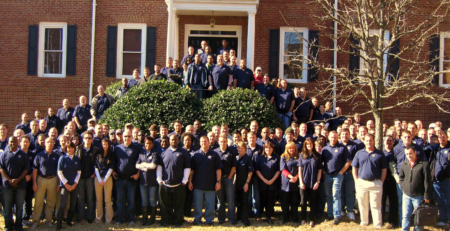10 Best IT Certifications For 2016
 With successful hacking attacks on many corporate and government systems and networks, CyberSecurity & Security training moves to the front in 2016. With over 1MM IT Security jobs available now as a result, and IT Security salaries rising fast, IT Security is here to stay at the front of IT work.
With successful hacking attacks on many corporate and government systems and networks, CyberSecurity & Security training moves to the front in 2016. With over 1MM IT Security jobs available now as a result, and IT Security salaries rising fast, IT Security is here to stay at the front of IT work.
1. Certified Ethical Hacking/Computer Forensics/Security Analyst/Licensed Penetration Tester. There are two kinds of organizations today, those that know they have been hacked, and those that don’t know they have been hacked. From the highest levels of Government agencies, to the smaller commercial businesses, hackers are stealing secrets every day. Huge numbers of State-sponsored hackers are working tirelessly to obtain your information and turn it over to their own government and businesses to compete in the world stage. China became the #1 GDP country in the world a few months ago, largely from stealing the information on how to make products from organizations around the world and use it for their own use. There are a 1,000 ways to penetrate an organization’s networks, systems, and applications. The new Version 9 of Certified Ethical Hacking provides the information on how hackers work to enter your systems and what tools they use. This knowledge can be used to build your defenses against these attempts. Computer Forensics deals with what hackers found, copied, deleted, moved, etc of your information. This allows you to respond accordingly and better protect your networks with this information. This course and knowledge is needed by Police agencies all over the country to review what hackers have stolen. The new Version 9 of Security Analyst and Licensed Penetration Tester requires rigorous work, knowledge and reporting to learn how to do Vulnerability Assessments and Penetration Testing of networks, hardware, application, and programming. These courses together make up the knowledge base the proficient IT Security Professionals should have.
2. CISSP and CASP Security is one of the major concerns of any organization. With hundreds of thousands of other country state-employed hackers working to obtain your sensitive information, security today is at a high level. Businesses make substantial investments in information assets, including technology, architecture, and processes. These assets are protected on the strengths of the professionals in charge. Industry standards, ethics and certification of IS professionals becomes critical to ensuring that higher standards for security are achieved. Training for the CISSP exam covers all ten domains of the Common Body of Knowledge. This course should be attended by network and firewall administrators, information security officers, and anyone interested in understanding the principles, best practices, and core concepts of information systems security. CompTIA CASP The CompTIA Advanced Security Practitioner (CASP) Certification is a vendor-neutral credential. The CASP exam is an internationally targeted validation of advanced-level security skills and knowledge. While there is no required prerequisite, the CASP certification is intended to follow CompTIA Security+ or equivalent experience and has a technical, “hands-on” focus at the enterprise level. While the CISSP is primarily theory, the CASP is a hands-on approach.
3. Windows 10 Desktop Security starts with the correct installation, management, and maintenance of the Desktop Operating System. The correct use, oversight, remote management of this Operating System is the first place to begin Security policy. Incorrect installation could leave security holes that can be easily penetrated. These courses are intended for IT professionals who administer and support Windows 10 desktops, devices, users, and associated network and security resources. Students who seek certification in the 70-697 Windows 10 Configuring exam will also benefit from this course. This course is also intended to provide skills for Enterprise Desktop/Device Support Technicians (EDSTs) who provide Tier 2 support to users who run Windows 10 desktops and devices within a Windows domain environment in medium to large enterprise organizations.
4. CCNA, CCNA: Security, CCNP: Security Certifications The access to networks and systems is through routers and switches and Cisco provides the majority of that access. Your networks and systems need to be protected with the latest equipment and techniques. The CCNA course provides the introduction to Routers and Switches and is required for all higher level courses that follow. For the Security Professionals, the Cisco CCNA: Security is the next step. CCNA Security Certification meets the needs of IT professionals who are responsible for network security. It confirms an individual’s skills for job roles such as Network Security Specialists, Security Administrators, and Network Security Support Engineers. This certification validates skills including installation, troubleshooting and monitoring of network devices to maintain integrity, confidentiality and availability of data and devices and develops competency in the technologies that Cisco uses in its security structure.
Cisco CCNP Security is one of the keys to the IT Security Professional’s career. CCNP: Security knowledge is the way to ensure Network Security Engineers have the practical skills needed to deploy, service, maintain, and support Cisco network security solutions. CCNP Security delivers the practical skills needed to enforce cybersecurity performance, gain high quality security service levels, and meet compliance mandates.
5. MCSA/MCSE: Windows 2012 Server Security is one of the major concerns of any organization. With hundreds of thousands of other country state-employed hackers working to obtain your sensitive information, security today is at a high level. Businesses make substantial investments in information assets, including technology, architecture, and processes. These assets are protected on the strengths of the professionals in charge. Industry standards, ethics and certification of IS professionals becomes critical to ensuring that higher standards for security are achieved. Training for the CISSP exam covers all ten domains of the Common Body of Knowledge. This course should be attended by network and firewall administrators, information security officers, and anyone interested in understanding the principles, best practices, and core concepts of information systems security. CompTIA CASP The CompTIA Advanced Security Practitioner (CASP) Certification is a vendor-neutral credential. The CASP exam is an internationally targeted validation of advanced-level security skills and knowledge. While there is no required prerequisite, the CASP certification is intended to follow CompTIA Security+ or equivalent experience and has a technical, “hands-on” focus at the enterprise level. While the CISSP is primarily theory, the CASP has a more hands-on approach.
6. MCSA: SQL Server 2014 Most of the important data of organizations is contained in databases. Whether this data is maintained in the Cloud, on premise, or both, how is this data properly installed, managed, and maintained including all of the related Security aspects of the information. If the data is in the Cloud, can it be downloaded, by whom, and under what circumstances? As the business conducted on the internet continues to grow at a faster pace than brick-and-mortar retail locations, the potential to do this business lies in the ability to implement, manage and maintain large databases. Millions of websites provide the opportunity to find products through proper usage and installation of this database, a powerful scalable reliable engine for business success. Demonstrate to potential hiring managers your essential skills and breakthrough insights in developing and maintaining the next wave of mission critical environments by achieving the MCSA: SQL Server 2014 certification. This certification is your first step towards earning an MCSE: Data Platform or MCSE: Business Intelligence certification where properly trained individuals can find business opportunities in mass amounts of data that would otherwise go unnoticed.
7. VMware VMware vSphere: Install, Configure, Manage features intensive hands-on training that focuses on installing, configuring, and managing VMware vSphere® 6, which includes VMware ESXi™ 6 and VMware vCenter Server™ 6. This course prepares you to administer a vSphere infrastructure for an organization of any size and forms the foundation for most other VMware technologies in the software-defined data center.
8. CompTIA A+, Network+, Security+ As an example of the importance of these courses, they are required by the Department of Defense in Directive 8570 for all IT employees and contractors. These foundation level courses provide the hard facts on how systems work in a network, and how to be aware of Security implications with port access, routers, cards, etc. Without this knowledge, you may be guessing as to how DNS, subnetting and other aspects of the LAN/WAN work properly. CompTIA A+ certification is the one you need to take if your job responsibilities include entry-level computer service technician support duties and the support of computers running the Windows desktop operating systems. In this course, you’ll build on your end-user background knowledge as you acquire the specific skills required to install, configure, upgrade, troubleshoot, and repair PC hardware components and systems. You will also learn the specific skills you need to install, maintain, and troubleshoot the Windows desktop operating systems.
The CompTIA Network+ certification ensures that the successful candidate has the important knowledge and skills necessary to manage, maintain, troubleshoot, install, operate and configure basic network infrastructure, describe networking technologies, basic design principles, and adhere to wiring standards and use testing tools.
Security+, a CompTIA Certification is the primary course you will need to take if your job responsibilities include securing network services, network devices, and network traffic. You will build on your knowledge and professional experience with computer hardware, operating systems, and networks as you acquire the specific skills required to implement basic security services on any type of computer network.
9. PMP PMI’s certification provides the skills and abilities to manage large projects with critical paths, critical dates, available resources, and track the progress of the project from inception to completion.
10. MCSD: Web & SharePoint Applications How is code written to provide the best Security to the organization? Design your Web Applications to have the greatest affect and also be written in to provide Security in its use. How is SharePoint able to provide collaborative support for company work? Demonstrate your expertise at designing and developing collaboration applications with Microsoft SharePoint. To achieve this certification you must have a solid foundation of web programming skills using HTML5 with JavaScript and ASP.NET MVC 4. SharePoint has become the collaborative tool for most large organizations today.
Start your IT career with the CompTIA A+, Network+, Security+ at CED Solutions today!
CED Solutions is a Cisco Learning Partner, Microsoft Gold Learning Partner and the #1 location for Microsoft Certifications in North America for the last 6 years combined. CED Solutions is a CompTIA Partner, EC Council Partner, and many others and is one of the largest providers of training in North America. The Atlanta facility provides IT training for up to 300 students per day, with separate buildings dedicated to training. CED Solutions provides training for up to 10,000 students per year and students take up to 800 certification exams every two weeks.
CED Solutions provides training and certification for MCSD: SharePoint 2013 Applications Developer; MCSE: SharePoint 2013; Cisco CCNA; Cisco CCNP; Cisco CCNA Security; Cisco CCNP Security; Cisco CCNA Voice; Cisco CCNP Voice; Microsoft MCSA: Windows 2012 Server; MCSA: Windows 2008 Server; MCSA: SQL 2012 Server; MCSE: Business Intelligence SQL 2012 Server; MCSE: Data Platform SQL 2012 Server; MCSE: Desktop Infrastructure Windows 2012 Server; MCSE: Server Infrastructure Windows 2012 Server; MCPD: 6 Cert Visual Studio Developer; MCSD: Windows Store Apps C#; MCSD: Windows Store Apps HTML5; IT Healthcare Technician and many more.
CED Solutions, LLC, www.cedsolutions.com, info@cedsolutions.com, (800) 611-1840



